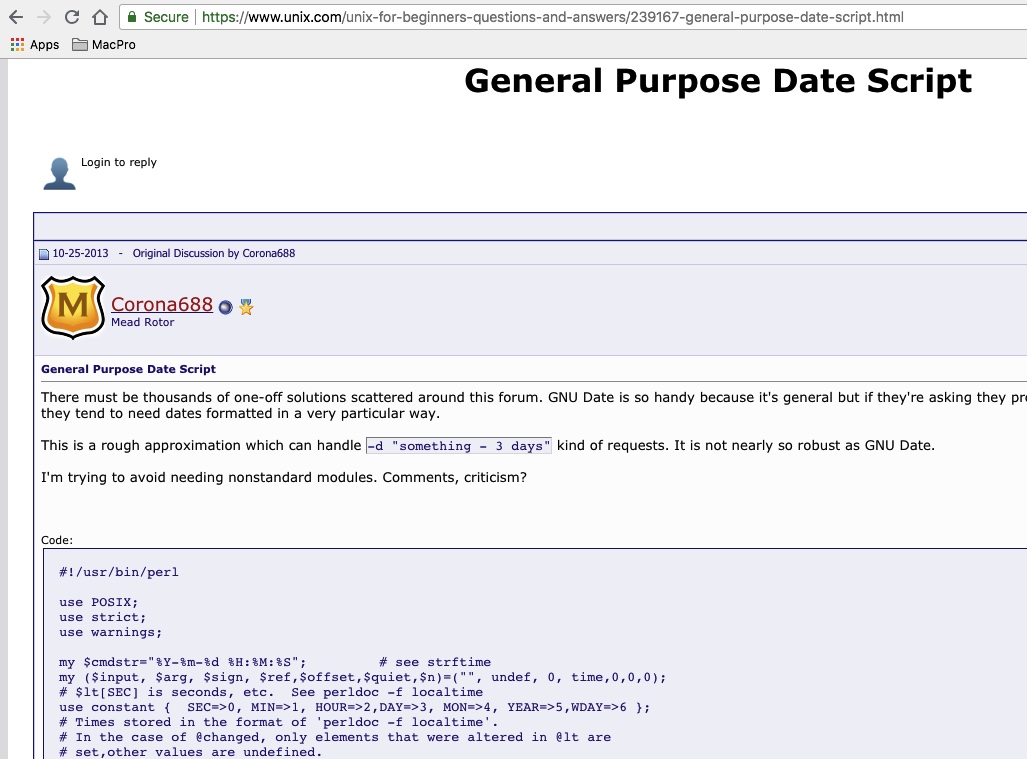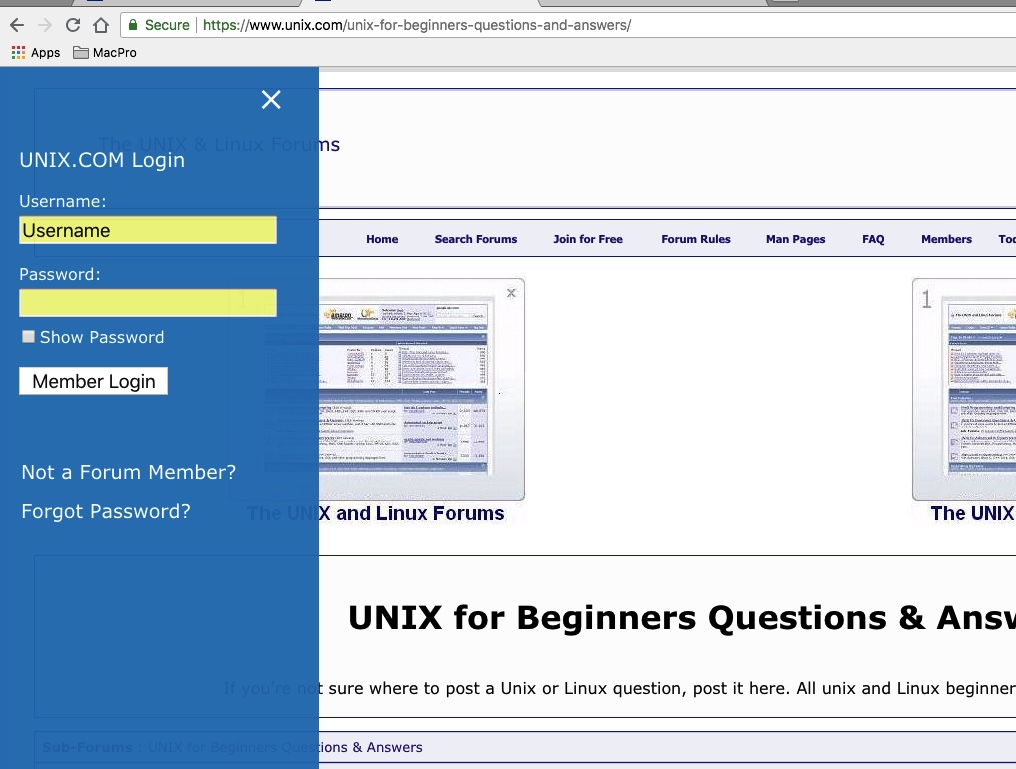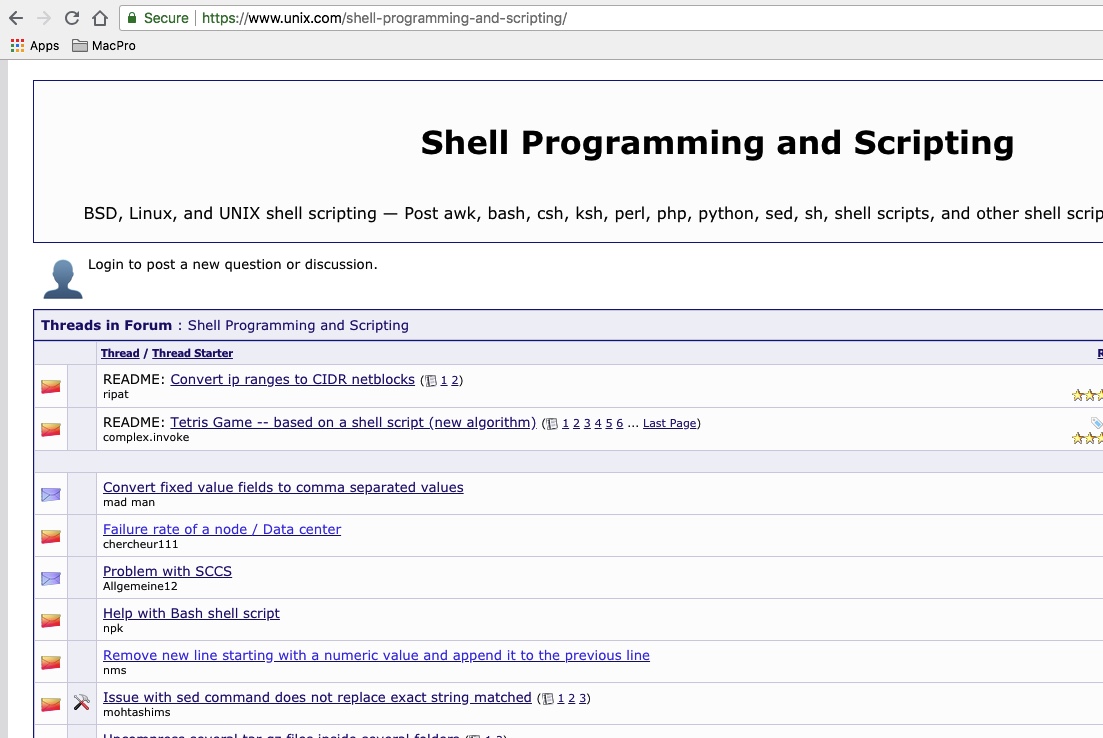|
|
Sponsored Content
The Lounge
What is on Your Mind?
Updates to Forum Navbar and Thread Reply for Unregistered Users
Post 303020127 by Neo on Saturday 14th of July 2018 08:11:49 AM
|
|
6 More Discussions You Might Find Interesting
1. Forum Support Area for Unregistered Users & Account Problems
This forum is intended only as a means to contact us if you are having trouble with your account. This forum is the only area on the site where even unregistered users can post. But because some spammers were using this to post spam, we have changed things a little bit. When an unregistered user... (0 Replies)
Discussion started by: Perderabo
0 Replies
2. Post Here to Contact Site Administrators and Moderators
And frankly, I'm a bit miffed by it.
I had thanked the person who suggested a solution to the issue, pasted code to a shell script that may have helped other users, and was courteous, witty and all that the best forum admins look for in a member/contributor/poster.
Now it's gone, with no... (1 Reply)
Discussion started by: SilversleevesX
1 Replies
3. Forum Support Area for Unregistered Users & Account Problems
Hi, Admin, I have met a problem that I cannot post new thread and reply after register.
It reminds some information as shown in the below:
case 1:
To create new threads in this forum your post count must be 10 or greater.
You currently have 0 posts.
case 2:
To reply to threads in this forum... (1 Reply)
Discussion started by: Unregistered
1 Replies
4. Forum Support Area for Unregistered Users & Account Problems
Hi, Scott, I am still meet a problem when I want to reply or create a new thread in "Shell Programming and Scripting" Forum, It reminds that:
To create new threads in this forum your post count must be 10 or greater.
You currently have 2 posts.
To my surprise, I posted a thread in "Shell... (4 Replies)
Discussion started by: weichanghe2000
4 Replies
5. Forum Support Area for Unregistered Users & Account Problems
Dear Moderator
I am not able to post any new thread or post reply to mine old thread.
Kindly help as i am stuck on one problem and needed suggestion.
Regards
Jaydeep (1 Reply)
Discussion started by: jaydeep_sadaria
1 Replies
6. Forum Support Area for Unregistered Users & Account Problems
I am unable to post reply to a thread. Whenever I will reply to any post I get the message every time :
The message you have entered is too short. Please lengthen your message to at least 5 characters.
Even though length of the message is more than required.
for example I tried to post
... (3 Replies)
Discussion started by: Unregistered
3 Replies
LEARN ABOUT DEBIAN
mason::manual::syntax
Mason::Manual::Syntax(3pm) User Contributed Perl Documentation Mason::Manual::Syntax(3pm) NAME
Mason::Manual::Syntax - Mason component syntax reference DESCRIPTION
A reference for all the syntax that can be used in components. SUBSTITUTION TAGS
<% expr %> Blocks of the form "<% expr %>" are replaced with the result of evaluating "expr" as a Perl expression in scalar context. Hello, <% $name %>! The current time is <% scalar(localtime) %>. Whitespace after '<%' and before '%>' is required. This gives us a little leeway in implementing variations on this tag in the future - it also just looks better. <% expr | filter,filter... %> A filter list may appear after a << | >> character in a substitution, containing one or more names separated by commas. The names are as filter methods on the current component class. The filters are applied to the result before it is output. <% $content | NoBlankLines,Trim %> See Mason::Manual::Filters for more information on filters. PERL LINES
%-lines Lines beginning with a single '%' are treated as Perl. The '%' must be followed by at least one whitespace character. <ul> % foreach my $item (@items) { <li><% $item %></li> % } </ul> % if ($.logged_in) { <div class="welcome"> Welcome, <% $.username %>. </div> % } % else { <a href="/login">Click here to log in</a> % } UNNAMED BLOCKS
Blocks that do not take a name argument. <%class> Contains Perl code code that executes once when the component is loaded, in the main body of the class outside of any methods. This is the place to use modules, declare attributes, and do other things on a class level. <%class> </%class> <%doc> Text in this section is treated as a comment and ignored. <%doc> Name: foo.mc Purpose: ... </%doc> <%flags> Specifies flags that affect the compilation of the component. Each flag is listed one per line in "key => value" form. <%flags> extends => '/foo/bar' </%flags> The "<%flags>" block is extracted in a special first pass through the component, so that it can affect the remainder of the compilation. The built-in flags are: extends Declares the component's superclass (another component). The path may be absolute as shown above, or relative to the component's path. This is the only way to declare the component's superclass; using an "extends" keyword directly will not work reliably. If not provided, the component's superclass is determined automatically via autobase components. Plugins may implement additional flags. <%init> Contains Perl code that is executed at the beginning of the current method. Equivalent to a "<%perl>" section at the top of the method. <%init> my $article = MyApp::Article->find($.article_id); my $title = $article->title; </%init> <%perl> Contains Perl code that is executed in place. The return value, if any, is discarded. May appear anywhere in the text and any number of times. <%perl> my $article = MyApp::Article->find($.article_id); my $title = $article->title; </%perl> <%text> Text in this section is printed as-is with all Mason syntax ignored. <%text> % This is an example of a Perl line. <% This is an example of an expression block. %> </%text> This works for almost everything, but doesn't let you output "</%text>" itself! When all else fails, use print: % $m->print('The tags are <%text> and </%text>.'); NAMED BLOCKS
Blocks that take a name argument. <%method name params> Creates a new method with the specified name and params. Uses Method::Signatures::Simple underneath, so $self and any other declared parameters are automatically shifted off of @_. <%method greet ($name, $color)> <div style="color: <% $color %>"> Hello, <% $name %>! </div> </%method> <%after name> <%augment name> <%around name> <%before name> <%override name> Modifies a content-producing method with the specified name. See Moose::Manual::MethodModifiers for a description of each modifier. $self is automatically shifted off for the body of "<%after>", "<%augment>", "<%before>" and " <%override" >. $orig and $self are automatically shifted off for the body of "<%around>". <%after render> <% # Add analytics line after everything has rendered %> <& /shared/google_analytics_line.mi &> </%after> <%augment wrap> <html> <body> <% inner() %> </body> </html> </%augment> <%around navbar> <div class="navbar_special"> <% $self->$orig() %> </div> </%around> <%override navbar> <% super() %> <a href="extra">extra</a> </%override> <%filter name params> Creates a filter method with the specified name and params. Works just like a "<%method>" block, except that you can call "$yield->()" to generate the original content. e.g. <%filter Row ($class)> <tr class="<% $class %>"> % foreach my $item (split(/s/, $yield->())) { <td><% $item %></td> % } </tr> </%filter> % $.Row('std') {{ First Second Third % }} generates <tr class="std"> <td>First</td> <td>Second</td> <td>Third</td> </tr> See Mason::Manual::Filters for more information on filters. CALLING COMPONENTS
<& path, args &> <& /path/to/comp.mi, name=>value, ... &> path is an absolute or relative component path. If the latter, it is considered relative to the location of the current component. args is a list of one or more name/value pairs. The path may be a literal string (quotes optional) or a Perl expression that evaluates to a string. To eliminate the need for quotes in most cases, Mason employs some magic parsing: If the first character is one of "[w/.]", comp_path is assumed to be a literal string running up to the first comma or &>. Otherwise, comp_path is evaluated as an expression. Here are some examples: # relative component paths <& topimage.mi &> <& tools/searchbox.mi &> # absolute component path <& /shared/masthead.mi, color=>'salmon' &> # this component path MUST have quotes because it contains a comma <& "sugar,eggs.mi", mix=>1 &> # variable component path <& $comp &> # variable component and attributes <& $comp, %args &> # you can use arbitrary expression for component path, but it cannot # begin with a letter or number; delimit with () to remedy this <& (int(rand(2)) ? 'thiscomp.mi' : 'thatcomp.mi'), id=>123 &> You can also call components with the comp and scomp methods. COMMENTS
<% # comment... %> A "<% %>" tag is considered a comment if all of its lines are either whitespace, or begin with a '#' optionally preceded by whitespace. For example, <% # This is a single-line comment %> <% # This is a # multi-line comment %> % # comment Because a line beginning with "%" is treated as Perl, "% #" automatically works as a comment. However we prefer the "<% # comment %>" form over "% #", because it stands out a little more as a comment and because it is more flexible with regards to preceding whitespace. % if(0) { } Anything between these two lines % if(0) { ... % } will be skipped by Mason, including component calls. While we don't recomend this for comments per se, it is a useful notation for "commenting out" code that you don't want to run. HTML/XML/... comments HTML and other markup languages will have their own comment markers, for example "<!-- -->". Note two important differences with these comments versus the above comments: o They will be sent to the client and appear in the source of the page. o They do not block component calls and other code from running, so don't try to use them to comment out code! <!-- Oops, the code below will still run <& /shared/expensive.mhtml &> --> WHITESPACE AND NEWLINES
Newlines between blocks Mason will ignore a single newline between blocks, so that you can space them nicely. Additional newlines beyond that will be displayed. <%class> ... </%class> <-- ignored <%method foo> ... </%method> <-- ignored <-- displayed <%method bar> ... </%method> Backslash at end of line A backslash () at the end of a line suppresses the newline. In HTML components, this is mostly useful for fixed width areas like "<pre>" tags, since browsers ignore white space for the most part. An example: <pre> foo % if(1) { bar % } baz </pre> outputs foo bar baz because of the newlines on lines 2 and 4. (Lines 3 and 5 do not generate a newline because the entire line is taken by Perl.) To suppress the newlines: <pre> foo % if(1) { bar % } baz </pre> which prints foobarbaz SEE ALSO
Mason AUTHOR
Jonathan Swartz <swartz@pobox.com> COPYRIGHT AND LICENSE
This software is copyright (c) 2011 by Jonathan Swartz. This is free software; you can redistribute it and/or modify it under the same terms as the Perl 5 programming language system itself. perl v5.14.2 2012-05-02 Mason::Manual::Syntax(3pm)



